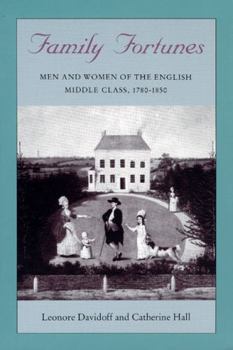Family Fortunes: Men and Women of the English Middle Class, 1780-1850
(Part of the Women in Culture and Society Series)
Select Format
Select Condition 
Book Overview
"Family Fortunes is a major groundbreaking study that will become a classic in its field. I was fascinated by the information it provided and the argument it established about the role of gender in the construction of middle-class values, family life, and property relations. "The book explores how the middle class constructed its own institutions, material culture and values during the industrial revolution, looking at two settings--urban...
Format:Paperback
Language:English
ISBN:0226137333
ISBN13:9780226137339
Release Date:August 1991
Publisher:University of Chicago Press
Length:576 Pages
Weight:1.70 lbs.
Dimensions:1.3" x 6.0" x 9.0"
Customer Reviews
2 ratings
A Class and a Half
Published by Thriftbooks.com User , 16 years ago
Family Fortunes is an account of the rise of the middle class, both as a class and as individuals, in England between 1780 and 1850. The book's focus is on "the delineation of gender difference at a time of rapid economic, political and social change." It argues that class consciousness always takes a gendered form and that the sexual division of labor within families was central to the development of capitalist enterprise. This approach rehearses arguments that are commonplace in feminist historiography, but Davidoff and Hall add a significant dimension to the case and hold their reader's attention through a narrative built around religion and ideology, economic structure and opportunity, and an account of gender in action in everyday life. Their section on religion and ideology is particularly informative and the strengths and weaknesses of the book can be ascertained by examining this section's analysis and contentions. (p.13) Religion played an important role in shaping the culture of the emerging middle class. Even though attitudes towards masculinity, femininity, and the family varied among the different Christian denominations, all accepted that the home had to act as the basis of moral order in the immoral world of the market. The family therefore stood at the center of attempts to construct a moral order for capitalism. Indeed the concept of the Christian family was a metaphor for the organization of society. The Birmingham Independent minister, John Angell James, stated that the family: "when directed as it should be, has a sacred character, inasmuch as the head of it acts the part of both the prophet and the priest of his household, by instructing them in the knowledge, and leading them in worship, of God; and, at the same time he discharges the duty of King by supporting a system of order, subordination and discipline." By extension, a congregation of believers gathered in a church was regarded as a family. The concept was also applied, through the language of paternalism, to social structures where the servants and laborers of the middle class man were seen "as the dependants and children of their father, their master, their guardian." Similarly business partners "were in some senses brothers who represented each other." (p.109, p.89, p.21, & W. Holdsworth, A History of English Law, cited ibid., p.200.) For middle class men the church also provided an opportunity to display their worthiness for public office by acting as church officials and engaging in public works. Davidoff and Hall note that by "the early nineteenth century the traditional concept of stewardship associated with aristocratic patronage and the devolution of obligations from the lord to his agent was transposed into religious discourse." (pp.73-74) The position the church assigned to women was filled with tension. In an eulogy of a pious Christian woman, James wrote that "the same blessed page which proclaims your dishonour in the sin of your first mother, dis
Summary of Family Fortunes
Published by Thriftbooks.com User , 23 years ago
Family Fortunes focuses on the rise and influence of the middle class in late eighteenth and early ninteenth century England. The book is divided into three distinct parts. The first section centers on "Religion and Ideology"; here, authors look at fractions among Protestant sects during their time period, and the mututally reinforcing ideas of domesticity and religion. The second section is called "Economic Structure and Opportunity." It begins with a discussion of middle class attitudes towards property, especially as it effects providing income for a family. The other discussion in this section looks at men and women's respective roles in the economy, focusing on men's action and women as the "hidden investment." The final section, "Everday Life: Gender in Action," looks at marriage, the respective roles of motherhood and fatherhood, defintion and importance of the home, how gender was registered and finally, middle class influcen in the reform-minded public sphere. Family Fortunes is a big, thick, informative book which is well worth reading for people interested in the rise of the middle class, and social or religious history. Though clearly scholarly in focus it is relatively accessible, and the use many different textual sources helps to illustrate some of the more dense parts of Davidoff and Hall's arguments.





